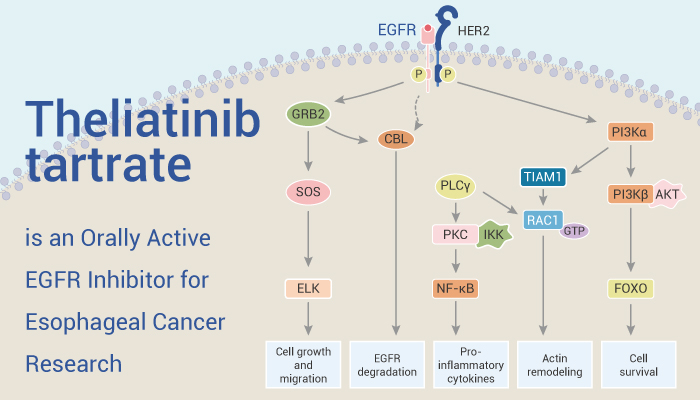EGFR stands for epidermal growth factor receptor, a tyrosine kinase and transmembrane receptor protein. It primarily functions to regulate epithelial tissue development and homeostasis. Moreover, EGFR is a driver of tumors. Specifically, it is often abnormally activated and overexpressed in cancer cells (such as esophageal cancer). EGFR selectively binds to EGFR ligands to form dimers and activates ligand autophosphorylation through its tyrosine kinase activity. The resulting intracellular EGFR signal can promote the proliferation of cancer cells, block apoptosis, and activate cell invasion/metastasis. And also stimulate tumor-induced neovascularization. EGFR inhibitors are important anti-cancer agents, such as Theliatinib tartrate.
Notably, esophageal cancer (EC) is the eighth most common cancer worldwide. EGFR is mutated and/or overexpressed in esophageal cancer and also leads to tumor drug resistance. Therefore, EGFR-targeted inhibitors can exert excellent inhibitory effects on esophageal cancers with high EGFR protein expression or gene copy number. Some specific EGFR inhibitors can bind to the intracellular catalytic domain of EGFR, thereby inhibiting EGFR autophosphorylation and downstream signaling. Here, we’ll introduce Theliatinib tartrate, an orally effective EGFR inhibitor against esophageal cancer.
Theliatinib tartrate potently, and selectively inhibits EGFR phosphorylation.
As for cell assay, Theliatinib tartrate has high affinity with EGFR (Ki=0.05 nM; IC50=3 nM). It also inhibits EGFR T790M/L858R mutant with an IC50 value of 22 nM. And it significantly inhibits the phosphorylation of EGFR in A431 cells (IC50=7 nM). It inhibits the survival of several cancer cells with IC50s of 80 nM (A431), 58 nM (H292), 354 nM (FaDu), respectively.
In vivo studies with animal models, Theliatinib tartrate results in excellent tumor regression in NOD-SCID mouse in patient derived esophageal cancer xenograft (PDECX) models. It (2-15 mg/kg; po; once daily for 21 days) inhibits the tumor growth in PDECX models with EGFR gene amplification (PDECX1T0326 and PDECX1T0950) with inhibitory rates of 32% and 75%, respectively. Theliatinib tartrate also inhibits the phosphorylation of downstream targets, AKT and ERK (p-AKT and p-ERK).
Above all, Theliatinib tartrate is an orally active EGFR inhibitor. It exerts good in vitro and vivo anti-tumor activity by inhibiting phosphorylation of EGFR, as well as AKT and ERK.
References:
[1] Ren Y, et al. Oncotarget. 2017 Apr 19;8(31):50832-50844.
[2] Ciardiello F, et al. N Engl J Med. 2008 Mar 13;358(11):1160-74.